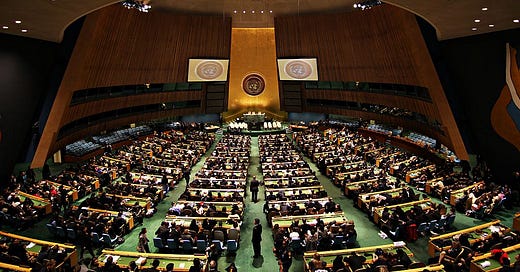History is rhyming: Col. Yevgeny Vindman on the ineffectiveness of the U.N.
An addendum to my post of February 24th, 2022
In a recent Foreign Policy article titled Putin’s War Is an Existential Crisis for the United Nations, Colonel Yevgeny Vindman argues that the UN “needs to be replaced by an organization where one nation cannot escape accountability because it is in a special class.” (Yevgeny Vindman is the identical twin brother of Col. Alexander Vindman who, as witness to Trump’s “perfect” phone call to Ukrainian President Volodymyr Zelensky, testified at Trump’s first impeachment inquiry.)
Col. Vindman’s point was already made by Sri Aurobindo in his 1950 postscript chapter to The Ideal of Human Unity, from which I quoted in this post. We recall Sri Aurobindo’s words:
In the constitution of the U.N.O. an attempt was made ... to escape from [the errors made by the League of Nations]; but the attempt was not thoroughgoing and not altogether successful. A strong surviving element of oligarchy remained in the preponderant place assigned to the five great Powers in the Security Council and was clinched by the device of the veto.... A third attempt, the substitution of a differently constituted body, could only come if this institution collapsed as the result of a new catastrophe.... The League of Nations came into being as a direct consequence of the first war, the U.N.O. similarly as a consequence of the second world-wide conflict. If the third war ... does come, it is likely to precipitate as inevitably a further step and perhaps the final outcome of this great world-endeavour [towards Human Unity].
What follows is an abridged version of Col. Vindman’s piece.
On June 30, 1936, Emperor Haile Selassie of Ethiopia appeared before an international body [The League of Nations] that had been charged with maintaining world peace and providing a forum for resolving international disputes. Haile Selassie pleaded for his people to prevent further destruction by a power bent on a war of conquest, Benito Mussolini’s fascist Italy. The assembled nations listened and sympathized but ultimately took no action to stop the war. Three years after Haile Selassie’s address, with the League of Nations proven incapable of preventing state aggression, the world once again was at war. The same sides that aligned in favor of and against Italy became pitted against each other. The cost in lives grew from tens of thousands in 1936 to tens of millions by 1945.
Nearly 86 years later, history is rhyming. The world, through 21st-century information technology, now views a war of conquest in Europe in near real time. Russia’s war in Ukraine has upended a world order established in the wake of a worldwide conflict and designed to prevent wars of conquest and to prevent one dictator from attempting to shift the boundaries of nations at his own whim. Again, factions are forming — either in support of the aggressor state, led by a despot who stands in opposition to basic human rights, or in favor of the established order that obligates nations to refrain from wars of conquest.
Mussolini, a frustrated dictator, resorted to the barbarism of chemical weapons in 1936 to achieve what he could not gain by other means. As history rhymes, we can anticipate Putin also escalating his aggression through continued attacks on civilians, perhaps resorting to the use of chemical or even tactical nuclear weapons. Putin will do this and anything else in order to survive. No matter the cost, he must save face and claim victory — or face his own people not as a strongman but a featherweight.
The consequence of ceding even one additional inch of Ukraine in a war of aggression like this is dire. Granting Putin anything short of defeat reinforces the notion for tyrants that they can change borders by force if they are willing to pay a price in the lives of their own subjugated masses. Tyrants will make this choice every time for their own interests.
Any real Putin victory that recognizes his gains means the demise of the post-World War II rules-based order and corrupts the value of the United Nations system. The United Nations’ purposes include maintaining international peace and security, developing friendly relations among nations, and achieving international cooperation. The U.N. was meant to be a successor to the League, correcting its flaws. It hasn’t been perfect, but it has never been tested as it is now. How can the U.N. survive when one permanent member of the Security Council, charged with maintaining peace and security among countries, is the initiator of a war of aggression? The short answer is that it can’t in its current form.
A successor to the U.N. or a modified U.N. must follow this war. It must be an organization where one nation cannot escape accountability because it is in a special class. Tyrants and despots are watching this war and will learn what they can get away with. Other nations will draw lessons about giving up nuclear weapons. The stakes in the outcome of the present conflict cannot be overstated. Undoubtedly, the interest in ending the conflict and providing off-ramps is high. Policymakers will have to balance providing a face-saving exit for a nuclear-armed autocrat against saving the international rules-based system. Whatever the new organization, a total veto by one special status state will be antithetical to the purpose of that body.
My service on the White House National Security Council, which focused, in part, on international organizations, helped me appreciate the value of international organizations. Ultimately, any body that seeks to uphold international norms must have the ability to hold all its members accountable should they violate international law. Putin’s actions, like Mussolini’s, have uncovered the failings of the U.N. If this body fails in crisis and cannot preserve order, it should fade into oblivion like the League of Nations.



